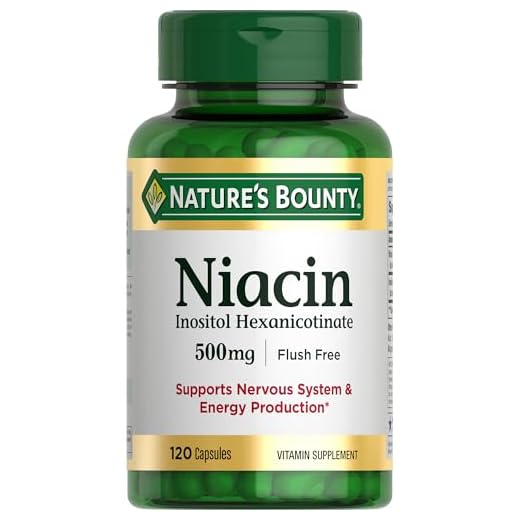







Vitamin B3, or niacin, can help you manage cholesterol effectively by lowering LDL cholesterol and raising HDL cholesterol, which improves heart health. Studies suggest it can reduce triglyceride levels and promote the synthesis of HDL cholesterol. Typical dosages range from 1,000 to 3,000 mg daily, but consulting with your healthcare provider is essential to avoid side effects like flushing and gastrointestinal issues. While niacin may not greatly reduce heart attack or stroke risk, it can play a role in an overall management strategy. There's much more to learn about its benefits and precautions, which can be critical for your health journey.
Key Takeaways
- Niacin, or vitamin B3, helps lower LDL cholesterol and increase HDL cholesterol levels, promoting better heart health.
- Typical niacin dosages for cholesterol management range from 1,500 to 3,000 mg daily, divided into multiple doses.
- While niacin lowers triglycerides by up to 25%, it does not significantly reduce heart attack or stroke rates.
- Common side effects of niacin include skin flushing, itching, and gastrointestinal distress, warranting consultation with a healthcare provider.
- Lifestyle changes, alongside niacin, are essential for effective cholesterol management and should be discussed with a healthcare professional.
Overview of Niacin
Understanding the role of niacin, or vitamin B3, is essential for anyone interested in cholesterol management. This B vitamin plays an important part in regulating cholesterol levels, as it lowers LDL cholesterol while raising HDL cholesterol. By inhibiting the liver's production of LDL cholesterol, niacin contributes to improved heart health. In addition, it enhances the synthesis of HDL cholesterol, often referred to as "good" cholesterol, which helps transport cholesterol away from the arteries. Additionally, vitamin B3 supports overall well-being and plays a role in maintaining healthy cholesterol levels, particularly by increasing HDL and lowering LDL cholesterol benefits of Vitamin B3.
Niacin is available in both dietary supplements and prescription forms, with typical dosages ranging from 1,000 to 3,000 mg daily for effective cholesterol management. However, before starting any supplements, it's important to consult with a healthcare professional due to potential side effects. Common side effects include skin flushing, itching, and gastrointestinal distress, which can be uncomfortable for some individuals.
While niacin can positively impact cholesterol levels, its effectiveness in reducing cardiovascular disease events remains debated. Recent studies suggest that niacin may have limited influence on heart attack or stroke rates. As a result, understanding both the benefits and limitations of niacin is important for making informed decisions about your health.
Niacin's Effect on Cholesterol
Niacin's impact on cholesterol levels is significant and well-documented. As a form of vitamin B3, niacin effectively lowers triglyceride levels by up to 25% and raises HDL (good) cholesterol by over 30%. This dual action is beneficial for cholesterol management, as it inhibits the liver's production of LDL (bad) cholesterol while promoting HDL synthesis, which helps remove LDL from your bloodstream. Additionally, Nature Made Flush Free Niacin offers a formulation that minimizes flushing effects, making it a comfortable option for many users.
For best results, typical doses range from 1,000 to 3,000 mg daily, with the most common recommendation being 1,500-3,000 mg divided into multiple doses. While niacin can enhance your cholesterol profile, it's crucial to recognize that research shows it doesn't necessarily lower the rates of death, heart attack, or stroke associated with heart disease.
Before starting niacin supplementation, consulting your health care provider is essential, especially considering that high doses can lead to side effects such as skin flushing, dizziness, and gastrointestinal issues. By working closely with your health care provider, you can effectively integrate niacin into your cholesterol management plan while monitoring any potential side effects.
Side Effects of Niacin
The use of niacin as a cholesterol treatment can come with a range of side effects that users should be aware of. Commonly, you might experience skin flushing, itching, or gastrointestinal issues such as nausea and diarrhea. These symptoms result from niacin's role in energy metabolism and its effects on blood vessels, which can sometimes be uncomfortable. While these symptoms can be bothersome, high doses of niacin can lead to more severe adverse effects, including liver damage and hyperglycemia, increasing the risk of gout *long-term consequences of prolonged high-dose niacin*.
It's vital to recognize that excessive niacin intake may also elevate your chances of developing diabetes, particularly if you have pre-existing conditions. Symptoms of niacin overdose may include rapid heartbeat, severe flushing, abdominal pain, and rash, which require immediate medical attention.
Additionally, serious reactions can occur, such as anaphylaxis and irregular heart rhythms, underscoring the significance of medical supervision during treatment. If you're considering niacin for cholesterol management, it's important to consult a healthcare professional to monitor your response to the medication and adjust dosages as needed. Staying informed about these side effects will help you make safer choices in your cholesterol management journey.
Alternatives for Cholesterol Management
Effective cholesterol management is vital for reducing the risk of cardiovascular diseases, and there are several alternatives to niacin that you might consider. Statins are the most commonly prescribed cholesterol medications, effectively lowering LDL cholesterol and minimizing cardiovascular event risks. If statins aren't suitable for you, alternatives like ezetimibe can help by reducing cholesterol absorption in the intestines, while bempedoic acid inhibits cholesterol synthesis in the liver.
For those with familial hypercholesterolemia or statin intolerance, PCSK9 inhibitors such as alirocumab and evolocumab are newer injectable options that markedly lower LDL cholesterol levels. However, remember that lifestyle modifications play an important role in cholesterol management. Adopting a heart-healthy diet rich in whole grains, fruits, and vegetables, along with regular exercise, can help maintain healthy HDL cholesterol and triglyceride levels without medication.
Regular monitoring of your cholesterol levels and consulting with your healthcare provider are vital steps to developing a personalized treatment plan based on your unique health needs. By considering these alternatives and making lifestyle changes, you can effectively manage your cholesterol levels and support your overall heart health.
Recommendations for Niacin Use
When considering niacin for cholesterol management, it's vital to follow specific recommendations to guarantee safety and effectiveness. Niacin, or vitamin B3, is typically recommended in dosages ranging from 1,000 to 3,000 mg daily, with common suggestions being 1,500-3,000 mg divided into doses. It's important to consult with a healthcare provider before starting niacin, as high doses can lead to side effects like flushing, gastrointestinal distress, and even liver damage.
To minimize stomach upset, take niacin as directed, often with food. Some brands are best taken at bedtime with a light snack to enhance effectiveness. While using niacin, avoid alcohol and hot beverages to reduce flushing effects and improve tolerance. Regular monitoring of your cholesterol levels and overall health is important during niacin treatment; this helps assess its effectiveness and mitigate potential adverse effects.
Conclusion
In managing cholesterol, niacin can act like a double-edged sword. On one hand, it boosts HDL (good cholesterol) while lowering LDL (bad cholesterol); on the other, it can bring side effects you need to take into account. Before diving in, it's essential to consult with your healthcare provider to weigh the benefits and risks. Remember, there's no one-size-fits-all solution, and exploring alternatives may lead you to a healthier path tailored just for you.




